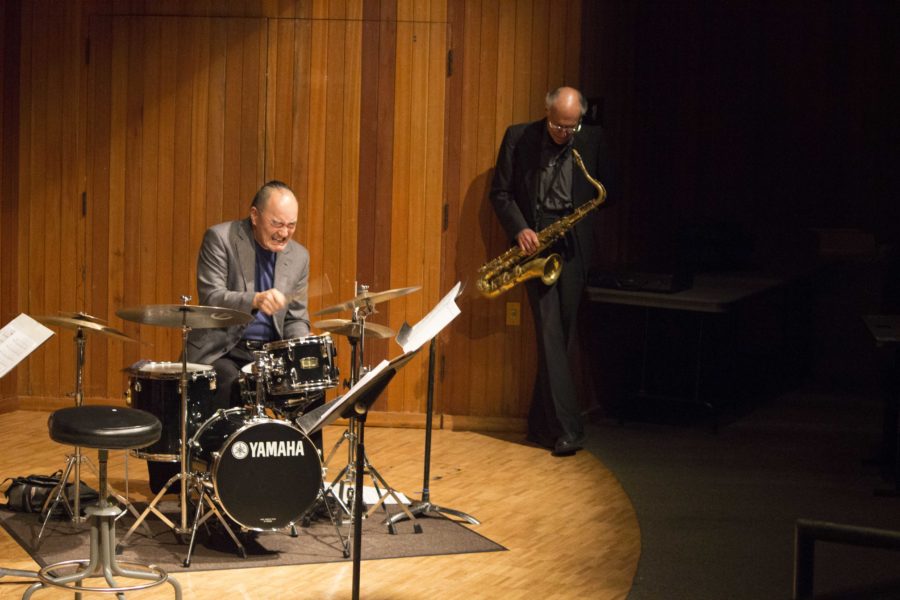Newman Auditorium hosted the Bennett Freidman Quartet Friday Nov. 15.
The gathered audience was an energetic mix of all age groups united by a love of music.
The foursome dressed in suit jackets and button-down shirts over black slacks as they flicked, plucked, strummed and teased jazz notes into the air for the audience to experience.
Bennett Friedman, Santa Rosa Junior College music professor and ringleader of the group, played saxophone.
The white-haired gentleman on piano was Larry Dunlap. Dunlap’s playing was the second voice and counter-balance for the sax. The other snowy – haired gent on upright bass was Supertramp alumnus Cliff Hugo; he provided the cool, deep backdrop for the rest of them. Akira Tana, the intense percussion expert, kept tempo with joy on his face. Each musician took turns in the spotlight, soloing regularly within each song.
They flung headlong into “Sister Sadie,” a punchy tune riddled with sudden momentary stops in tumbling beats. Friedman and his sax played center stage out front, swaying gently in a slate grey shirt and coat. The sax gave way to the piano solo while Tana meticulously ticked the cymbals, keeping time as Hugo faithfully plucked the deep-voiced bass that provided cool contrast to the fiery notes of the sax as it rejoined the tune playing into the night.
The quartet’s musical efforts evoked an atmosphere of metropolitan sophistication, as the stately wood walls of Newman auditorium gave the event grandeur without distracting from the group.
The banter among the musicians between songs provided moments of levity and entertainment as they traded jabs and gave some background on the upcoming pieces.
They next launched into a throaty tune by Michael Brecker, full of smooth anguish, like the guilty conscience of an angel. The tune conjured scenes of a hard-boiled detective in a smoky bar on a humid night, promising dangerous intrigue in the form of a dame in a red dress.
The ever-attentive audience showed their appreciation with applause when each musician finished a complicated passage and yielded to the next featured solo in the song. Each solo, from sax beeping to piano tickling, was evocative of the best traditions in jazz.
During Friedman’s downtime, as the others showcased their talents, the tall slender saxophonist would stroll to stage left, propping himself against the corner. The overhead lighting made him seem like a character against a lamppost: head down, hand in pocket, the sax resting against him, like a street philosopher who only spoke through the sax.
During one solo, Tana crashed out notes on the drums in time with an imagined rain downpour on a hot Chicago night; slowly he played it down to a trickle. The crowd applauded enthusiastically and Friedman returned with a sincere-sounding phrase that seemed to say, “don’t go, stay; two hearts can be as one.”
The tunes continued, each one a high-energy tumult of notes. The music never lingered for long before punching on to the next one.
The complex structure of the music tumbled and streamed into the audience, not to catch or be counted — that would be overwhelming — but to pass over them in delight.
Never heavy-handed, the quartet played from powerful, brash calamities to soft but quick trickling interludes; each time the audience applauded their appreciation of the skill displayed.
One song entitled “Peacocks” resembled two birds strutting on a rich lawn, each competing to be more beautiful than the other, as the sax would play a phrase only to be imitated by the piano. The scales climbed higher and higher until the music spilled into an elegant tune; the sax and piano still tossing phrases back and forth like competing birds, ending by gently fading out; the winner, the audience.
At times the music, with a rapid three count, would speed into chaos only to slow down to a zizag-zipping-rata-tap-tap as the group short-bursted through it.
In many of the pieces a flurry of short notes honked and beeped expertly by Friedman, followed by Dunlap’s piano interpretations of the sax’s phrase, leaving Friedman free to return to his darkened corner legs crossed, head nodding to the beat.
The eruptive playing style continued, ending the night in a vigorous shower of standing ovation applause.


